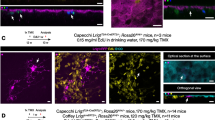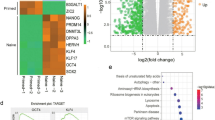Abstract
The Wnt gene family encodes a series of conserved glycoproteins that regulate pattern formation during embryogenesis, in a variety of tissues including the nervous system. As with other genes that control embryonic cell differentiation, members of the Wnt family have also been implicated in tumourigenesis. To search for Wnt genes involved in human teratocarcinomas, with a possible role in human embryogenesis, we used RT–PCR primed with degenerate oligonucleotides to analyse mRNA from differentiating cultures of the pluripotent human embryonal carcinoma (EC) cell line NTERA-2. NTERA-2 EC cells differentiate into neurons and other cell types when induced with retinoic acid. Wnt gene expression was not detected in the undifferentiated EC cells, but Wnt-related PCR fragments were amplified from differentiating cultures, 4–14 days after induction with retinoic acid. The RT–PCR products were composed primarily of DNA fragments corresponding to the recently identified human Wnt-13 gene. No other Wnt-related genes were identified. Northern analysis confirmed induction of Wnt-13 as a 2.4 kb mRNA during the early phases of retinoic acid-induced differentiation, and during differentiation along a non-neural pathway induced by hexamethylene bisacetamide (HMBA), but not in the terminally differentiated neurons. Wnt-13 remained expressed in non-neural differentiated NTERA-2 cells, even several weeks after the induction of differentiation. The time course of induction, its induction by HMBA, and its persistence in differentiated cells indicate that Wnt-13 expression is not dependent upon direct activation by retinoic acid. Wnt-13 was not detected, or only detected at low levels, in other human EC cells. However, it was found to be expressed at a high level in one malignant teratoma cell line, 577MF, that does not exhibit an EC phenotype although it was derived from a testicular teratocarcinoma. At least two members of the human frizzled gene family, thought to encode receptors for Wnt proteins, were also expressed in the NTERA-2 cells, suggesting the presence of a mechanism by which endogenously expressed Wnt-13 could modulate the histogenesis of teratocarcinomas by mediating interactions between sub-populations of differentiating EC cells. We note that Wnt-13 maps to chromosome 1p13, a region reported to be subject to relatively frequent loss of heterozygosity in germ cell tumours. Further analysis indicated that 465 bp of the published Wnt-13 sequence, within the predicted 5′ UTR, is incorrect and is possibly derived from a human mitochondrial DNA sequence.
Similar content being viewed by others
Author information
Authors and Affiliations
Rights and permissions
About this article
Cite this article
Wakeman, J., Walsh, J. & Andrews, P. Human Wnt-13 is developmentally regulated during the differentiation of NTERA-2 pluripotent human embryonal carcinoma cells. Oncogene 17, 179–186 (1998). https://doi.org/10.1038/sj.onc.1201942
Received:
Revised:
Accepted:
Published:
Issue Date:
DOI: https://doi.org/10.1038/sj.onc.1201942
- Springer Nature Limited
Keywords
This article is cited by
-
Wnt pathway reprogramming during human embryonal carcinoma differentiation and potential for therapeutic targeting
BMC Cancer (2009)
-
Low expression of Wnt-5a gene is associated with high-risk neuroblastoma
Oncogene (2005)
-
The secreted glycoprotein CREG inhibits cell growth dependent on the mannose-6-phosphate/insulin-like growth factor II receptor
Oncogene (2003)
-
Induction of TIG3, a putative class II tumor suppressor gene, by retinoic acid in head and neck and lung carcinoma cells and its association with suppression of the transformed phenotype
Oncogene (2003)
-
The secreted glycoprotein CREG enhances differentiation of NTERA-2 human embryonal carcinoma cells
Oncogene (2000)




